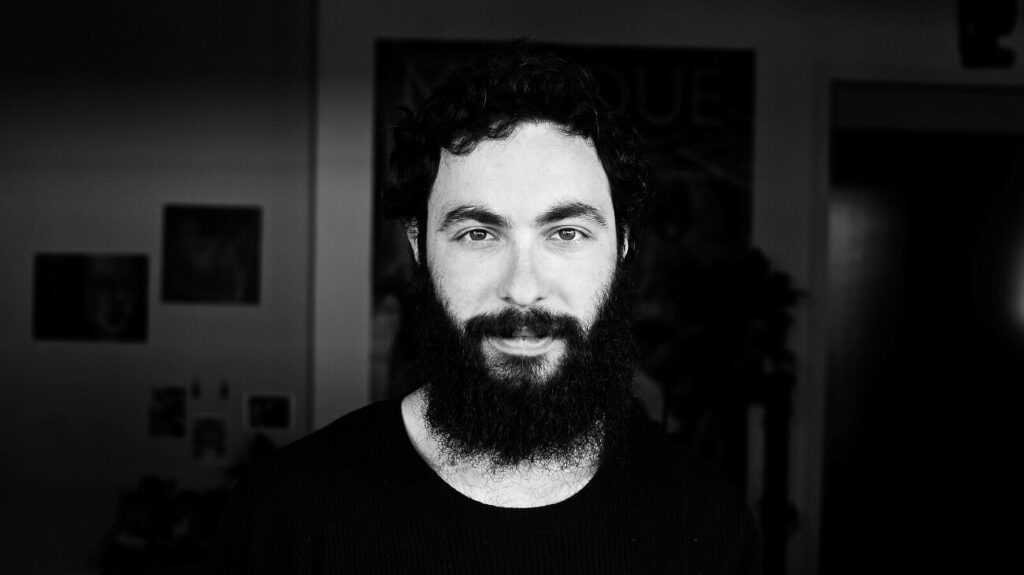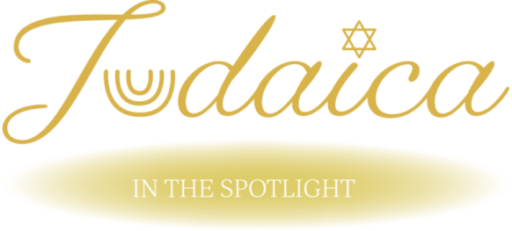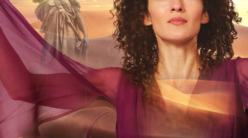
Photo: Courtesy of Zevi Slavin
Tell us a little bit about yourself and your background.
I grew up in the Chabad community of Sydney, Australia; exposing me at a very young age to both the raw beauty of nature, living near the breathtaking Australian shoreline, and to the rigorous system of philosophical mysticism of Hasidic and Kabbalistic Jewish thought as expressed by the school of Chabad thought.
What inspired you to start your project, Seekers of Unity?
Alongside both nature and philosophy, beach and books, was nursed within me an unconditional and indiscriminate love for humanity, Jew and non-Jew alike, by my parents. Watching and participating in their humanitarian passion project, Our Big Kitchen, an industrial-sized heart-powered community kitchen, where we opened doors to those with a yearning to give, help and volunteer to come and cook for the hungry. Watching my mother open her heart every day to the hungry and downtrodden opened my heart to use my tools and passions to help make this world a kinder, more tender place.
During my teen years, I began to broaden my reading interests and started reading beyond the strictly imprimatur Chabad cannon, my sins I do here confess, and began learning about different mystical traditions across the world, and I was shook, the beauty of the words and ideas that I had been fed as child, “you are created in the spitting image of G-d,” “there is nothing that exists that is not G-d,” including you and your darkest days, “true beauty and love is the capacity to see the divinity within every human you encounter.” These truths I saw reflected, repeated and reiterated by every spiritual tradition of the world, creating a luminous tapestry shining in the vacuous dazzling darkness of the cosmos like a thousand suns.
The warmth and beauty that I felt in those poems, in those truths, in those words and musky books was something that I could not but share. To bring hope to the hopeless, belief to the untrusting, meaning to the parched, and a story to the storyless. To show that “religious rapture, moral enthusiasm, ontological wonder, cosmic emotion, are all unifying states of mind, in which the sand and grit of the selfhood incline to disappear, and tenderness to rule.” To reunite the world’s religions and peel back to the primordial unity, the experience of oneness which we call God, the One, Nothingness, Being, the Infinite, the All, Tao, Thou, You.
Which aspects of mysticism intrigue you the most? Are there any concepts that fascinate you more than others at the moment?
I’m most intrigued by the quest to find the universal story, the truth that lies behind all doctrine, that can be discovered in first-hand experience and which compels us to be kind, humble and loving to our world and her inhabitants. To find our deep commonality, interdependence and unity without erasing our beautiful differences. Unity in Diversity, to borrow an overused truism.
Most recently the ubiquitous tripart theme of Death, Rebirth, Immortality; Thesis, Antithesis, Synthesis; Ego, Egolessness, Selfhood; the necessity of the journey thorough planting, shedding our skin, letting go of who we’re told we are, rotting, dissolving in the ground of being, before being resurrected, reborn, resprouting into our true self, our true infinite eternal identity, has been a really captivating idea for me. The rhythm of the cosmos. I’ve been tracking it down and sifting it out of ancient mythologists, with Jung, Campbell and Eliade at my side, arcane theosophists and brilliant metaphysicians; Plotinus, Augustine, Ibn, Arabi, Ibn Gabirol, Eckhart, Teresa of Avila, Luria, Shankara, Nagarjuna, Abulafia, Bӧhme, Spinoza, Hegel, Whitehead, Weil… and finding it in meditation and in the forest where the eternal process is manifest, “Meadow, grove, and stream, the earth, and every common sight, apparelled in celestial light,” is the true teacher.
Which three books would you recommend to someone who is interested in Jewish as well as non-Jewish mysticism?
Wow, three is an awfully small number when you put it like that. I made a short video on the channel called 10 Top Books to Read on Mysticism check it out here:
But if I was stuck on a deserted island without wifi, I’d be eternally glad to have packed one book on Jewish Mysticism… I was thinking of choosing the undisputed classic, Gershom Scholem’s magisterial Major Trends in Jewish Mysticism, but I won’t. I’m really going to live life on the edge right now and say Adam Afterman’s “And They Shall Be One Flesh, On the Language of Mystical Union in Judaism”; I cried tears of joy when I first read this book in the Gershom Scholem reading room in the National Library in Jerusalem; you must, must check out that room if you’re ever in Jerusalem, it’s probably the best room in the city. Thank you, Adam, please come on my channel so I can interview you if you’re reading this.
Okay, I get quite emotional when talking about books, my apologies. This was a sensitive question for me.
The general pick for Mysticism I think this time should go to the giant American intellectual, one of the founding father of both American Psychology and that distinct American Philosophy, Pragmatism, William James for his ground-breaking, untiring “The Varieties of Religious Experience”. I’m actually just reading a part of it now for some research on an upcoming video and boy does it make my heart swoon. This book will convert even the most hard-headed, boring human into a mystic. Here’s a quote from it, “..our normal waking consciousness, rational consciousness as we call it, is but one special type of consciousness, whilst all about it, parted from it by the flimsiest of screens, there lie potential forms of consciousness entirely different. We may go through life without suspecting their existence; but apply the requisite stimulus, and at a touch they are there in all their completeness… No account of the universe in its totality can be final which leaves these other forms of consciousness quite disregarded. How to regard them is the question,—for they are so discontinuous with ordinary consciousness. Yet they may determine attitudes though they cannot furnish formulas, and open a region though they fail to give a map. At any rate, they forbid a premature closing of our accounts with reality. Looking back on my own experiences, they all converge towards a kind of insight to which I cannot help ascribing some metaphysical significance. The keynote of it is invariably a reconciliation. It is as if the opposites of the world, whose contradictoriness and conflict make all our difficulties and troubles, were melted into unity.”
Evelyn Underhill’s Mysticism, A Study in the Nature and Development of Man’s Spiritual Consciousness would be my runner up pick for this category.
And because it would be at our own peril to neglect the East, the third and final pick is David Loy’s Nonduality, A Study in Comparative Philosophy, a brilliant exposition of Hindu (Avdaita Vednata) and Buddhist (Mahayana) metaphysics and a crack at showing how they’re not actually in conflict with one another (crazy, I know), but how they’re both united in their teaching on unity. Got to love that.
Do you occasionally collaborate with other people when creating content? If so, how can interested parties reach you?
Absolutely! I had originally created the project to connect with other people who have a shared interest in unity and mysticism. I have found so many new friends and colleagues through the channel and social media who have either come onto the channel to be interviewed or produced their own content which we were able to share. It’s been a real treat and gift and I hope to continue collaborating with people on the project. Every person is epic and has so much to give, this whole project would get really monotonous if it was just me. I’m inviting people from any background, religion, profession, country etc. to check out the project, fall in love with it, and reach out to me to take part and share their voice and to make it theirs as much as it is mine.
Hit me up at [email protected]
Where can our readers learn more about your work?
Our primary project platform is on Youtube where we upload an epic video every week, you should definitely subscribe and tell all yours friends to tell all theirs friends to subscribe, too
Additionally, you can (and should) find us and follow us on all of the social medias:
https://facebook.com/seekersofunity
https://facebook.com/seekersofunity
https://instagram.com/seekersofunity
https://www.twitter.com/SeekersofU
Our official website is: www.seekersofunity.com you can buy really cool merch, read our blog and do all kinds of fun stuff on there. Thank you to Elissa Siegel @eatnuravida for making it for me for free. You’re amazing. She sells really amazing Kimchi, I’ve eaten a bunch, it’s stinkin’ good, you should buy some from her to say thanks for the website.
If you’d like to support our project, Seekers of Unity, I’m a single student on a shoestring budget, and so far funding it all out of pocket, head over to our Patreon, to sign up for a monthly donation and get all kinds of cool benefits: https://www.patreon.com/seekers
Or drop us a one off donation at: https://paypal.com/paypalme/seekersofu
You’re awesome. Thank you.
Thank you so much Jewish Spotlight for shining your spotlight on my baby project and for the opportunity to answer these questions. I had so much fun answering this and totally forgive you for limiting my choice of books to a measly three.






